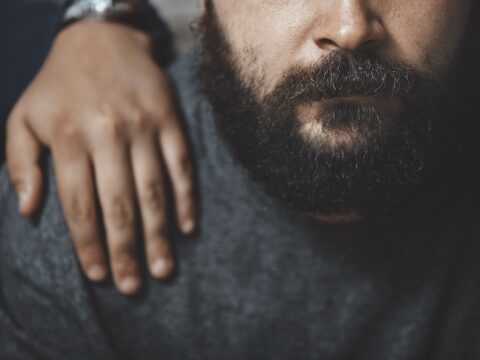Content warning: this story deals with murder, sexual assault and post-traumatic stress disorder.
Sean Cribbin doesn’t recall many details about the date he had in July 2017. But it’s the date he’ll never forget. He remembers the beads of sweat rolling down his forehead. He remembers the special drink concocted by the man he met through a dating app. And he remembers struggling to breathe as this person cut off his airway.
Cribbin, 53, believes that if his date’s roommate hadn’t come home early, his photograph would have been in the morning newspapers. His date was Bruce McArthur — the person who pleaded guilty to murdering eight men from Toronto’s gay village between 2010 and 2017. Their names were Skandaraj “Skanda” Navaratnam, Abdulbasir “Basir” Faizi, Majeed “Hamid” Kayhan, Soroush Mahmudi, Kirushna Kumar Kanagaratnam, Dean Lisowick, Selim Esen and Andrew Kinsman. Each name represents a life filled with happiness, complexity and potential.
McArthur, now 69, may never step outside prison as he isn’t eligible for parole until he’s 91. But the people he impacted through his heinous crimes — the families of the murdered and those like Cribbin who narrowly escaped — will carry their pain for the rest of their lives. It’s been more than three years since Cribbin’s brush with death, but instead of feeling relieved about his survival, he is plagued by overwhelming guilt. He can’t stop questioning why he lived. “People are telling me, ‘You were saved for a reason,’” Cribbin says. “I just don’t know what that reason is.”
Cribbin thinks a lot about what-ifs. His date with McArthur was originally scheduled in May, but they postponed because Cribbin had slept in. If that day went as planned, it would have been before McArthur killed Andrew Kinsman in June. “I wonder if I could’ve satiated that killing hunger for enough time to then have spared [Kinsman],” Cribbin says.
These are textbook symptoms of survivor’s guilt, a condition first described by American neurologist Stanley Cobb and German-American psychiatrist Erich Lindemann in 1943. They defined it as a psychological phenomenon that occurs after someone survives a traumatic event that others did not.
“People might experience this inflated sense of responsibility or inflated sense of failure,” says Katy Kamkar from Toronto’s Centre for Addiction and Mental Health. This can lead to torturous questions like “Did I have control over this?” and “What could I have done differently?”
Kamkar explains that the emotions hidden behind survivor’s guilt are grief and loss — emotions Cribbin knows all too well. McArthur “made me this shell of a person that I used to be,” Cribbin told Global News. “I used to be very confident and very outgoing.…I’m not dead and buried, but I’m not who I was.”
I first met Cribbin during a Christmas dinner at my boyfriend’s home in Mississauga, Ont., in 2016 — Steven Sauder is both my boyfriend’s biological father and Cribbin’s partner. Sauder has kept close ties with his children and ex-wife after coming out as gay in the late 1990s. As we sat at the table and played bingo after dinner, I couldn’t help but think how nerve-racking it must be for Cribbin to meet his partner’s family over the holidays.
Cribbin said very few words and gave bashful smiles that night. I found this to be a stark contrast to the tattoos crowding his arms and his thick septum piercing. But the more dinners we had together, the more he opened up, filling conversations with quirky quips and sassy comebacks.
I learned that this big, burly guy is a retired daycare teacher, who looked after preschoolers and handled daily activities like drama exercises, art projects and sensory learning. He loved his job and often went above and beyond, such as by throwing a Thanksgiving dinner for the kids every year, complete with a roasted turkey.
After the news of McArthur’s arrest in January 2018, I wondered if Cribbin and Sauder knew anything about the serial killer — after all, they were residents of the Village, Toronto’s historic LGBTQ2 neighbourhood. But before I could ask them, they broke the news to us at dinner one night: Cribbin had survived a date with McArthur.
With that, I began following Cribbin’s journey to finding peace after a brush with death by one of the most notorious murderers in Canadian history.
Cribbin and Sauder are in an open relationship, which means they both date and have sex with others. And Cribbin has a particular interest in kink. In the early 2000s, he was an active part of the Toronto leather community — a queer subcategory where leather clothing signifies a person’s membership and sexual preferences — and was crowned Mr. Leatherman Toronto in 2005.
He found McArthur on three different gay dating apps between 2014 and 2017. What attracted him most was McArthur’s brazen bio, detailing how he pushes limits. And perhaps because of McArthur’s landscaping job, he had the physique to back it up.
They agreed McArthur would pick up Cribbin a few blocks from Cribbin’s apartment. During the ride, McArthur kept quiet as Cribbin commented on the recent disappearances in the area. At McArthur’s apartment, Cribbin knew that his date was making him a drink with GHB, a colourless, tasteless drug that, in small doses, can enhance sexual pleasure. But one drop too many and it becomes the date-rape drug. The latter is what Cribbin ended up consuming.
More on Broadview:
- After the Montreal Massacre
- Inside the United Church-led fight against conversion therapy
- COVID-19 brings new challenges for abuse survivors
The cardinal rule for practitioners of kink, Cribbin says, is that everything needs to be consensual. And, as outlined in the Criminal Code, a person can’t give consent if their consciousness is impaired. In an interview in March 2018, Cribbin says he didn’t find McArthur’s aggressive choking unusual at first, but then he began to panic — he couldn’t breathe.
One of the only things Cribbin vaguely remembers after that is hearing McArthur’s roommate in the apartment. Cribbin doesn’t even remember how he got home. Still, he thought McArthur was just an awkward, bad date. He told Sauder about his experience, but otherwise didn’t think of it any further.
When McArthur’s arrest in January 2018 for the murders of Selim Esen and Andrew Kinsman hit the news, Sauder saw McArthur’s picture and thought he looked like Cribbin’s type. He took his iPad to Cribbin with the article open. Just like that, Cribbin was face to face with the man he hadn’t thought much about in a year and a half. All Cribbin could say was, “Oh my God.”
The day after he learned of McArthur’s arrest, and before he could decide whether to alert police about his date with McArthur, the Toronto police called him for an interview. Cribbin says police described photographs that they had found of him unconscious in McArthur’s apartment. Cribbin has no recollection of the pictures being taken, but there’s speculation that McArthur took photographs of his victims to keep as trophies.
Realizing that he, out of sheer luck, potentially survived McArthur’s murder scheme, Cribbin found himself flooded with guilt. He kept asking himself why his life was spared but not the others. He started experiencing frequent night terrors where he’d see McArthur’s face in shadows. Intrusive memories and flashbacks like these are common symptoms of survivor’s guilt; they can be so vivid that it’s like reliving the trauma. Cribbin would wake up, screaming and sobbing. “This man had broken me,” Cribbin says. “I was mourning the loss of myself.”
Two more events led to Cribbin’s worst night terror. First, he spoke with McArthur’s roommate earlier this year, the one who had come home unexpectedly. Cribbin thanked the roommate for interrupting what could have been his death. The roommate then told Cribbin that coming home was a complete fluke — his plan to stay over at his boyfriend’s happened to be cancelled.
“This man had broken me. I was mourning the loss of myself.”
Sean Cribbin
Cribbin felt unsettled learning exactly how close he had been to dying. And then he saw a CBC docudrama that re-enacted police breaking into McArthur’s home while he was in the middle of a date. When the actor playing McArthur asked his date, “Does anyone know you’re with me?” Cribbin immediately had a flashback to McArthur posing that exact question right before they went to his apartment. He told McArthur the truth: that he normally tells Sauder where he is, but that he’d just tell him later that night.
Soon after, Cribbin violently woke up one night; his cries made Sauder jump up out of bed. “It was just enough to shake me up, and I couldn’t actually go back to sleep right away,” says Cribbin. “I had to sleep with a baseball bat.”
On the first day of McArthur’s court hearing, Cribbin sat in the front along with the victims’ families. He wanted to get as close as possible so he could look at the man who once took control over his body. “I had to go just for a sense of closure, even though there’s no closure in this for anyone,” Cribbin says. “It was just another thing I had to do to get to a spot where I could move forward.”
But he regretted his seating choice once the Crown started reading the agreed statement of facts. He started thinking about the victims’ loved ones sitting in the courtroom. Although all of their lives had been upturned by McArthur, Cribbin survived. The guilt was overwhelming.
He did find some comfort in observing McArthur, who rarely lifted his head. Cribbin noticed how his muscular figure had shrunk significantly since they last saw each other. “To see it wither away was, in a way, satisfying,” Cribbin says.
With time, Cribbin is slowly coming to terms with what McArthur did to him and the twist of fate that allowed him to survive. He’s having fewer panic attacks and nightmares. The what-ifs that would crowd his mind now rarely make an appearance. He’s in therapy. “I know I’m getting better because I just told my psychiatrist that I was optimistic for 10 minutes last week!” Cribbin says cheekily.
Sauder and Cribbin’s relationship only seems to get stronger, even through unthinkable circumstances. Besides coping with the fallout from McArthur, they’ve weathered the death of Sauder’s eldest son, his ex-wife’s breast cancer, Cribbin’s near-fatal hospitalization after contracting pneumonia and having a stroke, and now a global pandemic. “Those are pretty extreme things, and we still like each other’s company and make each other laugh,” Cribbin says. “Without him, I would dissolve.”
Their relationship is still open, but Cribbin’s dating life has been affected. He explains his PTSD to potential dates and why it flares up before sex. “People are nice, generally. And no one wants to be the one to cause me more trauma. So a lot of people just would not get involved at all in anything with me,” Cribbin says.
He is still trying to find a reason for his survival, and he feels like he’s getting closer. He’s working on a memoir and has submitted a documentary, Was I Next? The Sean Cribbin Story, to film festivals. Both feel therapeutic rather than daunting. “The more I talk about it,” says Cribbin, “[the more] I become a character in the story in my head. And it’s just like I’m telling the story.” Moreover, he hopes that his work will encourage others to practise safe online dating. He wants to donate a portion of any revenue he makes from these projects to charity.
Cribbin and Sauder also hope to move out of Toronto, either to a quieter town nearby or somewhere in Ireland, where Cribbin holds citizenship. Once he feels some form of closure, he wants a more relaxed lifestyle where the people around him aren’t going to see him as just a survivor of a high-profile serial killer.
“I don’t want people to look at me as that guy who went out with McArthur,” Cribbin says. “I just want people to look at me and say, ‘Oh, that’s Sean.’”
This story first appeared in Broadview‘s December 2020 issue with the title “A survivor’s guilt.”
Celina Gallardo is a writer in Toronto.
We hope you found this Broadview article engaging.
Our team is working hard to bring you more independent, award-winning journalism. But Broadview is a nonprofit and these are tough times for magazines. Please consider supporting our work. There are a number of ways to do so:
- Subscribe to our magazine and you’ll receive intelligent, timely stories and perspectives delivered to your home 10 times a year.
- Donate to our Friends Fund.
- Give the gift of Broadview to someone special in your life and make a difference!
Thank you for being such wonderful readers.
Jocelyn Bell
Editor/Publisher















Guilt is a result of sin.
Sir, God has been gracious enough to spare your life once, perhaps you have a God given gift to share with others. John 8 would be a good lesson here. A woman was spared death. When she realized it, Christ told her to move on in life. Christ never approved or accepted her sin, but He told her to leave her life of sin.
First article was in Dec 2020?
Hi Ken, our December issue comes out at the beginning of November, so we begin posting articles from that issue around then. I know it’s a bit confusing!